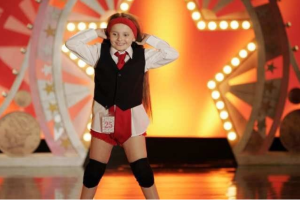46 Little Miss Sunshine (2006)
Winners Vs. Losers in Little Miss Sunshine
by Ashley Elfrank
A common trend in modern society is comparison. How much money do you have compared to another person? Do you have a nicer car compared to your neighbors? Is your house as remodeled as the rest of the houses in your neighborhood? Are you fat or are you skinny? Are you a winner or are you a loser? Little Miss Sunshine revolves around the mindset of winners and losers and the DPD issue of socioeconomic class differences associated with that. The film centers around the Hoovers, a dysfunctional family aching to make ends meet and accomplish the so-called “American Dream”. Their family struggles throughout the film with suicide, poverty, body image issues, and the constant question, Do you want to be a winner or a loser? We spend so much time questioning and breeding misery to conform that we often overlook the beauty of suffering and embracing human experiences. I grew up watching this movie and it has become more applicable to my life as I’ve entered adulthood. Throughout the plot, various characters open up to discarding the idea of the “perfect family” and embrace the dysfunctionality they possess because it’s how they love. With various themes tying directly into DPD issues, Little Miss Sunshine analyzes the struggles of poverty, questioning beauty standards, and what it means to be successful.
The film centers around the Hoovers, a family of six from all walks of life. Richard and Sheryl are the parents of Olive and Dwayne. Richard is a motivational speaker eager to sell his book on the 9-point plan to success and fixates his life through the vision of only seeing people as winners or losers. He has spent the family’s entire savings on promoting his plan to success, leaving Sheryl to be the breadwinner. His father, Edwin, is a homophobic heroin addict in the last leg of his life. After being kicked out of his nursing home, he is taken into the Hoover’s crowded household. Sheryl is a full-time working mother doing her best to reduce the heat that Richard ignites when he purges his insufferable mindset onto the rest of the family. Her unemployed brother Frank is also welcomed into the home after he attempted suicide when his boyfriend left him for another man who happened to be his academic competition. He is the #1 Proust Scholar in the world and often sarcastically brings that fact up when he is put in compromising situations. Uncle Frank is played by Steve Carell who is straight, which is an unfortunate misrepresentation of the only LGBTQ character in the film. Dwayne is a depressed 15 year old who’s obsession with flying fighter jets and the works of philosopher, Fredric Nietzsche, leads him to take a vow of silence until the end of the film. Olive is a charismatic 7-year-old, obsessed with beauty pageants and dancing. She is admitted to compete in the beauty pageant, Little Miss Sunshine, in California. This leads this underfunded family to load into an old, yellow VW bus and travel from their home in Albuquerque to California so that Olive can compete.

This film was released in 2006, two years before the economic collapse of 2008, so the Hoover’s financial struggles are completely relevant to the time. Although their struggles are related to funding Richard’s dream in hopes of financial success, it is valid to recognize them as being below the poverty line. Relating to DPD, Richard is a straight white man forcing his family to support his absurd mindset as well as accept the fact that he depleted their savings for what he wants and not what the family needs. He leaves little room for happiness making him the real loser because he “lives his life through the binary of winning and losing” (artofsmart.com.au). The power he holds as being the assumed head of household because he’s a man creates tension in his marriage with Sheryl as she tries to clean up his mess. This is reflected specifically during a scene (0:13:43) at the beginning of the film where Sheryl has prepared dinner for the family after a hard day at work and the mental toll of picking up Uncle Frank from the hospital after his suicide attempt. During the dinner, Olive asks Uncle Frank why he’s now living with them and what happened to his bandaged wrists. Richard immediately jumps in during Frank’s explanation and calls him a loser for turning to suicide in front of the whole family. Grandpa Edwin also makes a homophobic remark when Frank mentions that he had a same-sex partner. The power asserted by the straight white men of the household shaped the tone of the family dinner. It also invalidated Frank’s situation simply because he is gay and has mental health issues, which means he’s a loser in Richard’s eyes. Despite the colorful cinematography and bright natural lighting of the scene, the dialogue makes the moment very dark instead of focusing on a blended family trying to have a meal.
An important topic of conversation in Little Miss Sunshine relates to differences in beauty standards and gender norms. The upbeat youngest daughter, Olive is eager to show off her routine for the pageant that she and Grandpa Edwin have carefully curated. Once the family hits the road to California, Richard starts the conversation of comparison and what true beauty standards are. At their first stop at a diner (0:25:35), Olive orders waffles and ice cream for breakfast. Richard almost immediately criticizes his 7-year-old, questioning her if she thinks the winners of Miss America eat ice cream. He also goes on a tangent about how fat people are losers and skinny people are winners, asking her which one she wants to be. Everyone else at the table jumps down Richard’s throat and supports Olive saying that she can be whatever she wants to be and eat whatever she likes.

Later in the film, Olive inadvertently challenges the sex roles that women play and what societal standards are during her performance at the pageant. The irony of this is that beauty pageants are already sexualizing children with concerning make-up looks and suggestive outfits on minors. As her grandpa coaches her, he makes it so that she almost sexualizes herself without anyone else having the opportunity. She starts the dance out in a suit and hat when Super Freak by Rick James starts playing, challenging the gender norms of the pageant with young girls dressed in short dresses and bra tops. An essay analyzing the post-feminism aspect of the film and how the framework of Judith Butler corresponds with Olive’s performance reads, “Because gender performance regulation is present in various institutions, social structures, and relationships, this shows that the categories themselves are socially constructed and not easily maintained.” (Happel, 43). Throughout her time on stage, Olive rips off parts of her costume and dances in a raunchy manner to a raunchy tune. She is unaware of her effect on the judges and her family who have never seen her routine. She simply is doing what her Grandpa coached her how to do and having fun while doing it. She negates typical beauty standards in this scene and in a naive way, takes back her femininity and sexuality by sexualizing herself. It is important to note that her Grandpa died in the middle of the film from a drug overdose, so it’s very important to her that she makes him proud and performs the entire dance. Rolling Stone writes, “Although over-sexualization of 10-year-olds is acceptable in beauty pageants, Olive’s burlesque performance comes off as a shock.” (rollingstoneindia.com). The judges try to have her removed forcefully. The Hoover’s all jump on stage to dance, letting go of their issues, and protecting Olive so she can have her moment.
At first, I could not point out any blatant discriminatory details in the film until I realized Richard’s entire view on life is based on discrimination. He only sees people as winners or losers and fluctuates his behavior based on who he’s interacting with. Throughout the plot, he is rude and dismissive towards anyone who varies from being successful, skinny, happy, mentally stable, etc. It isn’t until after his father’s death and the fact that his book on a 9-point plan to success fails that he reconsiders his mindset. His boss explains to him that nobody will sell his book simply because nobody knows who he is, making him a loser. Before his father dies, he tells him how proud he is that his son attempted to make his own dreams come true and how rare that is. Richard only then chooses to stop his competitiveness to be a winner and his discriminatory actions toward losers because in reality, he is both. After Olive is removed from the pageant and banned from competing in all pageants in the state of California, the family comes full circle. Richard finds happiness in the love he has for his family and chooses to stop living a life of competitive hatred. Uncle Frank realizes the beauty in his suffering and Dwayne decides that his life is worth living despite his dreams being crushed by his color blindness. Sheryl finally feels validated in her relationship with Richard when they all come together and Olive was able to perform for her routine and dedicate it to the late Grandpa Edwin.
I chose this film because it has a big place in my heart. My birth mom loved this movie and would often watch it on repeat throughout my childhood. We had a strained relationship and this movie always brought us to common ground and made our hearts open up kind of how the characters felt by the end of the road trip. I wanted to analyze the film on a deeper level because there is so much important content and ideas that the script holds. The sexualization of children at beauty pageants to challenging gender norms and beauty standards and even the power dynamic of straight white men contributing to the patriarchy inspired me. Little Miss Sunshine isn’t quiet about these topics and it’s interesting to see how they weaved relevancy and relatable content into a 90-minute film.
Are you a winner or a loser? I think that’s an unfair question and Little Miss Sunshine agrees. There’s much more to someone than whether they are a winner or a loser. Fat or skinny. Rich or poor. Sober or addicted to heroin. Gay or straight. The multifaceted layers of a human being far outweigh any simple question of comparison. When we deny the suffering of our existence and limit ourselves to an unbreakable category, we become tainted and cruel. Comparison is the basis of discrimination and pointing out differences to use them against each other breeds hatred and misery. Only when we acknowledge our human experiences as being worth more than meeting the capitalist status quo or conforming to societal norms, is when we will fulfill our desire for true happiness. Real happiness, prosperity, and all of the emotions associated with being alive are what make you a true winner.
References
Sullivan, Ashley. “The Ultimate Guide to Analyzing Little Miss Sunshine for English: Summary & Analysis.” Art Of Smart Education, 14 Dec. 2022, artofsmart.com.au/english/little-miss-sunshine-analysis/#:~:text=’Little%20Miss%20Sunshine’%20explores%20a,ideals%20of%20suffering%20and%20love.
Bhatnagar, Tanushi. “15 Years of ‘Little Miss Sunshine’: More Relevant Now than Ever.” Rolling Stone India, 22 Aug. 2021, rollingstoneindia.com/15-years-of-little-miss-sunshine-more-relevant-now-than-ever/#:~:text=While%20the%20broad%20theme%20of,family%20as%20a%20social%20institution.
Gender and Contemporary Film – Gender Forum, genderforum.org/wp-content/uploads/2017/02/2013_Gender_Film_Complete.pdf. Accessed 2 June 2023.

